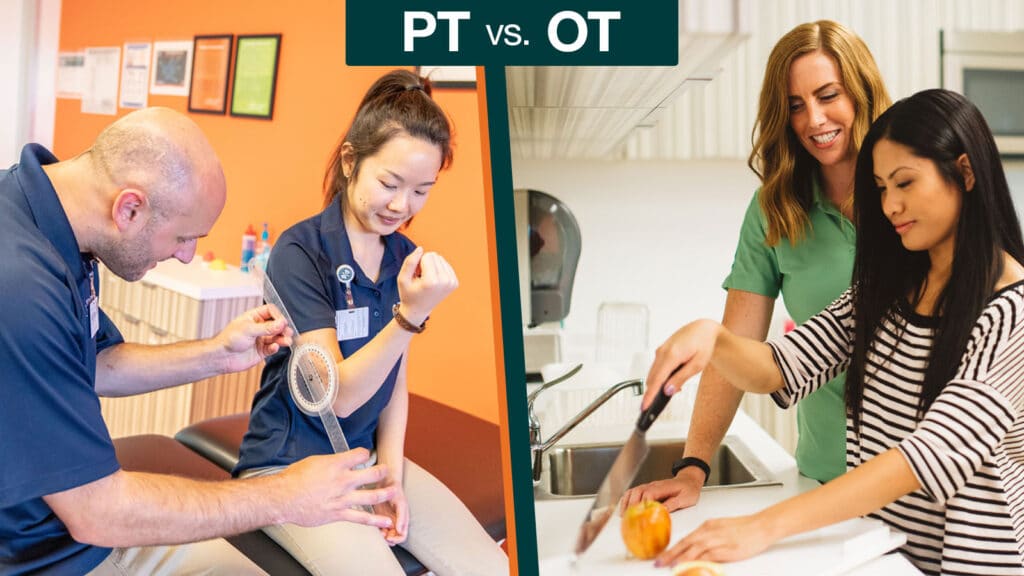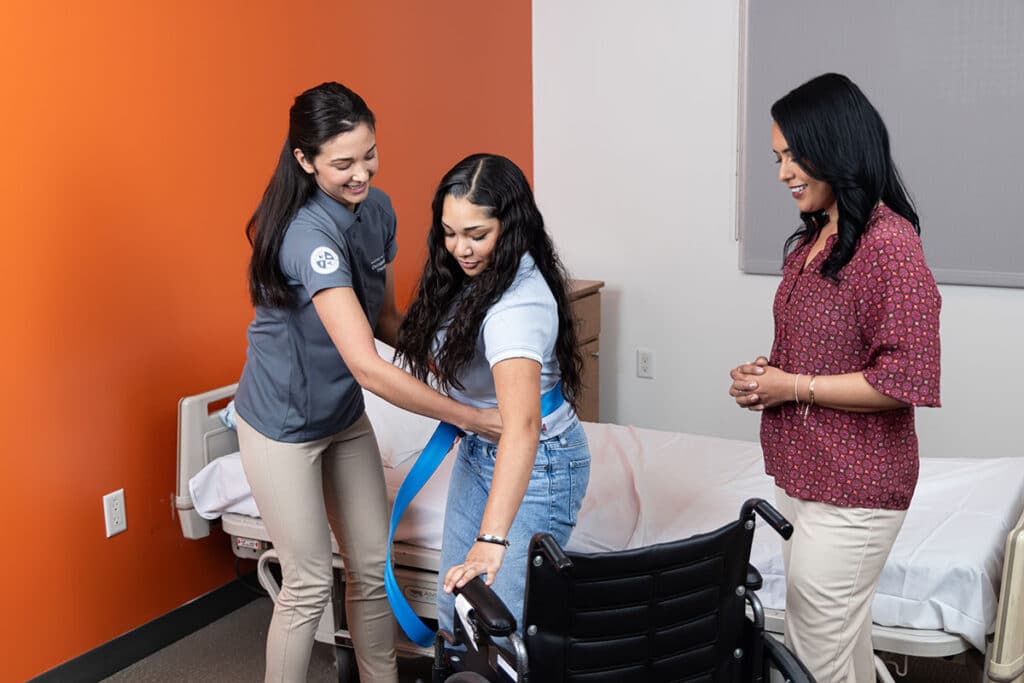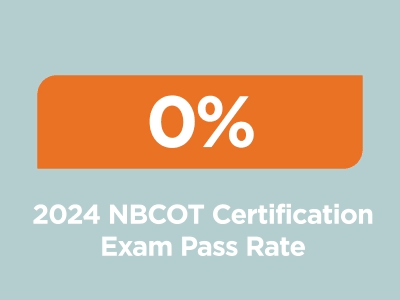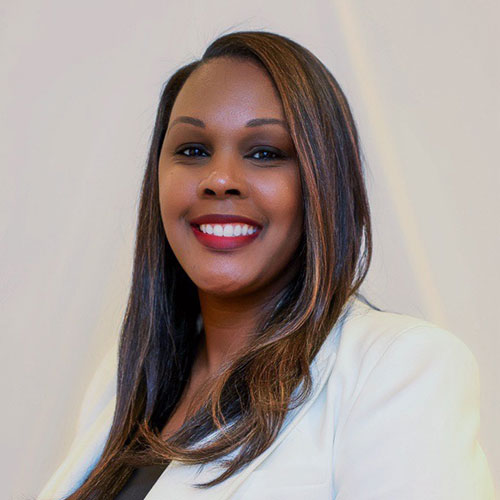Healthcare



Earn your Master of Science in Occupational Therapy degree in 24 months
The Dean’s Scholarship and Community Leader Scholarship are available to new students starting WCU’s MSOT program
Fieldwork experience starting in the first year and continuing until graduation
Interprofessional setting that lets you study alongside students in different healthcare disciplines
Occupational therapy assistant pathway: Your gateway to MSOT, no bachelor's required!
Diverse faculty that represents a wide array of expertise in the field

Our MSOT program at the Center for Graduate Studies is designed to give you the knowledge and clinical practice you need to enter the occupational therapy field.
The program emphasizes hands-on practice while providing personal and professional development opportunities such as community events and one-on-one mentorship with an experienced OT faculty mentor. Students will have 1-2 days per week of online synchronous learning that gives them the ability to engage with their professors and peers in real time. Our MSOT program helps you become a well-rounded healthcare practitioner, putting the focus on ethics and patient-centered care.
Personal Information you submit through our Sites, such as your name, address and other contact information, may be collected by West Coast University for internal marketing and development purposes as well as to respond to your inquiry, complete a transaction for you, or fulfill other forms of customer service. You can choose not to receive marketing from us by “unsubscribing” using the instructions in any marketing email you receive from us.
On-Campus and Online Synchronous Learning
96 Credits
24 Months
6 Trimesters
| Core Occupational Therapy Courses | ||
|---|---|---|
| Core Occupational Therapy Courses | ||
| OCC 510 | Foundations of Occupation and Occupational Therapy | 2.0 |
| OCC 511 | Occupations Across the Lifespan | 2.0 |
| OCC 512 | Introduction to Fieldwork I | 1.0 |
| OCC 513 | OT Evaluation and Screening I | 3.0 |
| OCC 514 | Introduction to Research | 2.0 |
| OCC 515 | Basic Patient Care Skills | 2.0 |
| OCC 516 | Integrated Physiology and Anatomy | 5.0 |
| OCC 520A | Occupational Performance in the Older Adult | 4.0 |
| OCC 520B | Skills Lab: Older Adults | 2.0 |
| OCC 521 | Fieldwork I- Older Adults | 1.0 |
| OCC 522 | OT Evaluation and Screening II | 2.0 |
| OCC 523 | Brain, Behavior and Occupation | 3.0 |
| OCC 524 | Movement Analysis in Occupation | 3.0 |
| OCC 525 | Evidence-based Practice I | 2.0 |
| OCC 526 | Occupations in Practice | 2.0 |
| OCC 531A | Occupational Performance in the Adult | 4.0 |
| OCC 531B | Skills Lab: Adult | 2.0 |
| OCC 532 | Fieldwork I – Adults | 1.0 |
| OCC 533 | Evidence-Based Practice II | 2.0 |
| OCC 534 | Preparatory Methods I | 3.0 |
| OCC 535 | Assistive Technology | 4.0 |
| OCC 541A | Occupational Performance in Children and Adolescents | 4.0 |
| OCC 541B | Skills Lab: Children and Adolescents | 2.0 |
| OCC 542 | Fieldwork I – Children and Adolescents | 1.0 |
| OCC 543 | Introduction to Fieldwork II | 1.0 |
| OCC 544 | Preparatory Methods II | 4.0 |
| OCC 545 | Occupational Wellness | 4.0 |
| OCC 546 | Professional Management and Leadership | 3.0 |
| OCC 551 | Preparation for Professional Practice | 1.0 |
| OCC 552 | Fieldwork II-A | 12.0 |
| OCC 562 | Fieldwork II-B | 12.0 |
| Total Credit Hours: | 96.0 | |
How Much Does the Master of Science in Occupational Therapy Program in LA Cost?
We know school is a substantial commitment. At WCU, we want to equip you with all the information you need to make the right decision for your future.
Our goal is to give you a clear understanding of Los Angeles MSOT tuition costs so you can be well-informed as you navigate the application and enrollment process. To assist you in your decision, we provide a breakdown below of the MSOT program costs in Los Angeles at West Coast University.
We offer several financial aid options — including scholarships, grants, and loan access — to help support you through your studies.
| Degree Type | Master of Science (Enrolling prior to April 1, 2024) | Master of Science (Enrolling After April 1, 2024) |
| Total Program Credits | 96 | 96 |
| Program Length (Full-time) | 6 trimesters | 6 trimesters |
| Tuition Cost (per credit) | $919 | $919 |
| Total Tuition Cost | $88,224 | $88,224 |
| Application Fee (non-refundable) | $0 | $0 |
| STRF Fee1 (non-refundable) | $232.50 | $0 |
| EstimatedTotal Book Costs3 | $3,611 | $3,612 |
| Estimated Total Book Shipping Cost2 | $361 | $361 |
| Estimate for Uniforms Fees2 | $75 | $75 |
| Estimate for Supplies & Licensure Preparation Fees2 | $70 | $70 |
| Technology Fee3($150 per trimester) | $900 | $900 |
| Estimated Total Program Costs | $93,473.50 | $93,242 |
Indirect Costs
| 8 Month Academic Year4 | ||||
| Prior to Fall I 2024 | Starting Fall I 2024 | |||
| with parents | off campus | with parents | off campus | |
| Federal Student Loan Fees | $220 | $220 | $220 | $220 |
| Course Materials (Personal Electronic Device-1st year only) |
$1,000 | $1,000 | $1,000 | $1,000 |
| Professional License, Certificate, or First Professional Credential |
$270 | $270 | $270 | $270 |
| Living Expenses (Food & Housing) | $3,552 | $11,840 | $3,728 | $12,432 |
| Transportation | $2,456 | $2,456 | $2,584 | $2,584 |
| Personal Expenses | $8,048 | $8,048 | $8,448 | $8,448 |
| Total | $15,546 | $23,834 | $16,250 | $24,954 |
1 Effective April 1, 2024, the Student Tuition Recovery Fund (STRF) assessment rate will be zero dollars and zero cents ($0.00) per one thousand dollars ($1,000) of institutional charges.
The State of California established the Student Tuition Recovery Fund (STRF) to relieve or mitigate economic loss suffered by a student in an educational program at a qualifying institution, who is or was a California resident while enrolled, or was enrolled in a residency program, if the student enrolled in the institution, prepaid tuition, and suffered an economic loss. Unless relieved of the obligation to do so, you must pay the state-imposed assessment for the STRF, or it must be paid on your behalf, if you are a student in an educational program, who is a California resident, or are enrolled in a residency program, and prepay all or part of your tuition.
You are not eligible for protection from the STRF and you are not required to pay the STRF assessment, if you are not a California resident, or are not enrolled in a residency program.
It is important that you keep copies of your enrollment agreement, financial aid documents, receipts, or any other information that documents the amount paid to the school. Questions regarding the STRF may be directed to the Bureau for Private Postsecondary Education, 1747 N. Market Blvd. Ste 225 Sacramento, CA 95834, (916) 431-6959 or (888) 370-7589.
To be eligible for STRF, you must be a California resident or enrolled in a residency program, prepaid tuition, paid or deemed to have paid the STRF assessment, and suffered an economic loss as a result of any of the following:
To qualify for STRF reimbursement, the application must be received within four (4) years from the date of the action or event that made the student eligible for recovery from STRF.
A student whose loan is revived by a loan holder or debt collector after a period of noncollection may, at any time, file a written application for recovery from STRF for the debt that would have otherwise been eligible for recovery. If it has been more than four (4) years since the action or event that made the student eligible, the student must have filed a written application for recovery within the original four (4) year period, unless the period has been extended by another act of law.
However, no claim can be paid to any student without a social security number or a taxpayer identification number.
2 The Estimate for Book, Program Attire, and Supply fees reflect the Manufacturer's Suggested Retail Price totals compiled in January 2022 and are subject to change. Supplies become student purchases once issued to student. Students who drop or have been dismissed after supplies have been issued will assume ownership for these items and will not be eligible for refunds. For details on all of the supplies, contact the Bursar Office.
Fees do not include indirect costs, which may include but are not limited to background checks, health screenings/requirements for clinical, out of state fieldwork placements, and/or transportation.
Refer to the Program Fee Schedule for a breakdown of expected indirect costs.
3 Technology Fee includes student technical support, Office 365, blended and online course delivery/learning management system, mobile app, student portal technology and access, and required electronic course materials/software.
4 The purpose of the Cost of Attendance (COA) is to provide students and families with an estimated cost to attend West Coast University. The COA includes both direct and indirect cost estimates. Direct costs are paid directly to West Coast University and are shown separately for each program. Indirect costs are not paid to West Coast University and are estimates students may use to budget expenses they may incur while attending school. While actual indirect costs may vary, West Coast University estimates these amounts based on the number of months in an academic year and whether students will live with parents or off campus.
Note 1: Students who wish to take Challenge Exams will be subject to a fee of $100 for each Challenge exam. Please see the campus Bursar Office for a full price listing.
Note 2: Course Audits - If a course(s) is being audited. Credits for these courses will be included for the student's schedule status for courses taken by semester. Audit course fees will be incurred by program, based on these schedule statuses shown above.
Note 3: Applicants are conditionally accepted to the Master of Science in Occupational Therapy program until a non-refundable $250.00 good faith payment for a Seat Deposit has been submitted. The Seat Deposit is not a separate charge but will be credited to the program costs should the student not cancel their enrollment. The University will retain the full amount of this deposit should the student cancel their enrollment at any time, for any reason. Seat Deposits may be paid by credit card, debit card, money order, or cashier's check made payable to West Coast University. A Seat Deposit will be collected for each enrollment and cannot be applied to or carried over to enrollments for other programs or start terms. At their discretion, the Executive Director may refund the full Seat Deposit for unusual or unexpected circumstances that would warrant a full refund.
A student applying for admission to a graduate program at West Coast University must:
Program-specific application requirements and prerequisites:
To view a full list of program requirements, please visit our catalog.
Academic terms begin in Spring, Summer, and Fall. To see a list of term start and completion dates, view the Academic Calendar.
West Coast University prepares MSOT and OTD students to be successful professionals, by emphasizing holistic client-centered care, evidence-based practice, and critical thinking skills. A part of our mission at West Coast University is to embrace a student-centric learning partnership. We continuously pursue more effective and innovative ways through which our students develop the competencies and confidence required in a complex and changing world.
Our facility is technologically advanced and provides students with an environment that promotes innovative learning methods designed to develop skilled, confident, and competent therapists. Our faculty members represent a wide array of expertise in the field of occupational therapy.
We are a family here at West Coast University. As you step through our doors, you will feel a comfortable and supportive environment. We provide a quality education for our students. We are a tight-knit group and believe that it’s ok to have fun while you learn.
Our legacy is our graduates. They make us proud daily, as they continue to propel the profession forward as leaders, advocates, and trailblazers, exhibiting industry-current solutions to promote quality of life.
Thank you for your interest in our MSOT program. I look forward to meeting you during our interview season.
Warmest regards,
Stacey Willis, OTD, BSOT, OTR/L
Dean & Program Director,
Occupational Therapy Program at WCU-CGS
We offer two scholarship opportunities to help you pursue your occupational therapy degree. The Dean’s Scholarship and Community Leader Scholarship are available to new students enrolling in WCU’s Master of Science in Occupational Therapy or Occupational Therapy Doctorate programs.
Visit WCU’s online catalog to read more about available scholarships and their eligibility requirements.
Graduates of the MSOT program will have the opportunity to cultivate the knowledge, skills, and professional behaviors necessary to accomplish the following in their occupational therapy practice:
The MSOT Student Handbook is designed to help you navigate through your time in our program. The handbook provides an overview of academic standards, policies and procedures, student resources, and expected behaviors — all in a single location.
WCU OT Student Handbook, please click here.
WCU OT Fieldwork Education Manual, please click here.
NBCOT Certification data for the program is available at the NBCOT website.
Graduates of the MSOT program are eligible to sit for the national certification exam. This exam is administered by the National Board for Certification in Occupational Therapy (NBCOT). Most states require licensure to practice, and state licenses are usually based on the results of the NBCOT Certification Examination.
Learn more about NBCOT and the certification exam.
Please note that in order to take the national certification examination the following questions will be asked:
Certification Preparation at WCU
We aim to prepare our students so that they feel confident when going into the certification exam and are able to perform at their best. Below are our graduation and certification rates for the MSOT program:
Graduation Data
| Year | Students Entering/Graduating | Graduation Rate |
|---|---|---|
| Year | Students Enter/Grad | Grad Rate |
| 2022 | 68/64 | 94% |
| 2023 | 68/67 | 99% |
| 2024 | 60/56 | 93% |
| Total | 196/187 | 95% |
NBCOT Certification Data
| Year | Number of Students Taking Exam | Number of Students Who Passed Exam | Passage Rate |
|---|---|---|---|
| Year | Num. of Students Taking Exam | Num. of Students Who Passed Exam | Passage Rate |
| 2022 | 67 | 63 | 94% |
| 2023 | 66 | 61 | 92% |
| 2024 | 60 | 57 | 95% |
| Information Sessions | To view available dates and reserve your virtual seat, click here! |
| Campus Tours | Available every Thursday at 4pm. Campus Address: 590 N Vermont Ave. Los Angeles, CA 90004 |
| Virtual Office Hours Available Weekly | Do you have more questions about WCU? We have virtual office hours where you can speak 1-1 with an advisor on Fridays from 3pm- 4pm PST. |
Our occupational therapy assistant pathway opens the doorway to your MSOT degree. Get the preparation you need to practice autonomously. You don’t need a bachelor’s to apply, and you can complete your master’s in as little as two years.
You qualify for the pathway if you have:
No bachelor’s needed! Speak to an advisor to review all requirements and learn if the OTA pathway is right for you.
West Coast University prepares MSOT and OTD students to be successful professionals, by emphasizing holistic client-centered care, evidence-based practice, and critical thinking skills. A part of our mission at West Coast University is to embrace a student-centric learning partnership. We continuously pursue more effective and innovative ways through which our students develop the competencies and confidence required in a complex and changing world.
Our facility is technologically advanced and provides students with an environment that promotes innovative learning methods designed to develop skilled, confident, and competent therapists. Our faculty members represent a wide array of expertise in the field of occupational therapy.
We are a family here at West Coast University. As you step through our doors, you will feel a comfortable and supportive environment. We provide a quality education for our students. We are a tight-knit group and believe that it’s ok to have fun while you learn.
Our legacy is our graduates. They make us proud daily, as they continue to propel the profession forward as leaders, advocates, and trailblazers, exhibiting industry-current solutions to promote quality of life.
Thank you for your interest in our MSOT program. I look forward to meeting you during our interview season.
Warmest regards,
Stacey Willis, OTD, BSOT, OTR/L
Dean & Program Director,
Occupational Therapy Program at WCU-CGS
We offer two scholarship opportunities to help you pursue your occupational therapy degree. The Dean’s Scholarship and Community Leader Scholarship are available to new students enrolling in WCU’s Master of Science in Occupational Therapy or Occupational Therapy Doctorate programs.
Visit WCU’s online catalog to read more about available scholarships and their eligibility requirements.
Graduates of the MSOT program will have the opportunity to cultivate the knowledge, skills, and professional behaviors necessary to accomplish the following in their occupational therapy practice:
The MSOT Student Handbook is designed to help you navigate through your time in our program. The handbook provides an overview of academic standards, policies and procedures, student resources, and expected behaviors — all in a single location.
WCU OT Student Handbook, please click here.
WCU OT Fieldwork Education Manual, please click here.
NBCOT Certification data for the program is available at the NBCOT website.
Graduates of the MSOT program are eligible to sit for the national certification exam. This exam is administered by the National Board for Certification in Occupational Therapy (NBCOT). Most states require licensure to practice, and state licenses are usually based on the results of the NBCOT Certification Examination.
Learn more about NBCOT and the certification exam.
Please note that in order to take the national certification examination the following questions will be asked:
Certification Preparation at WCU
We aim to prepare our students so that they feel confident when going into the certification exam and are able to perform at their best. Below are our graduation and certification rates for the MSOT program:
Graduation Data
| Year | Students Entering/Graduating | Graduation Rate |
|---|---|---|
| Year | Students Enter/Grad | Grad Rate |
| 2022 | 68/64 | 94% |
| 2023 | 68/67 | 99% |
| 2024 | 60/56 | 93% |
| Total | 196/187 | 95% |
NBCOT Certification Data
| Year | Number of Students Taking Exam | Number of Students Who Passed Exam | Passage Rate |
|---|---|---|---|
| Year | Num. of Students Taking Exam | Num. of Students Who Passed Exam | Passage Rate |
| 2022 | 67 | 63 | 94% |
| 2023 | 66 | 61 | 92% |
| 2024 | 60 | 57 | 95% |
| Information Sessions | To view available dates and reserve your virtual seat, click here! |
| Campus Tours | Available every Thursday at 4pm. Campus Address: 590 N Vermont Ave. Los Angeles, CA 90004 |
| Virtual Office Hours Available Weekly | Do you have more questions about WCU? We have virtual office hours where you can speak 1-1 with an advisor on Fridays from 3pm- 4pm PST. |
Our occupational therapy assistant pathway opens the doorway to your MSOT degree. Get the preparation you need to practice autonomously. You don’t need a bachelor’s to apply, and you can complete your master’s in as little as two years.
You qualify for the pathway if you have:
No bachelor’s needed! Speak to an advisor to review all requirements and learn if the OTA pathway is right for you.

Our MSOT students get one-on-one support through every step of their job search. Our dedicated Career Services team can help with anything from resume writing to interview coaching.1
Additionally, MSOT students are matched with an occupational therapy faculty mentor from day one of their education, giving them the ability to get continuous professional guidance and learn about the different environments and fields where they could practice as occupational therapists.
Occupational therapists can work in a variety of settings and specialties. According to the U.S. Bureau of Labor Statistics, occupational therapists most often work in:

Dr. Stacey Willis obtained her doctorate degree in occupational therapy from the University of Southern California in 2012, and her undergraduate degree in occupational therapy from California State University Dominguez Hills in 2002. Dr. Willis is an expert in psychosocial occupational therapy treatment and has been working in community-based mental health for the past 12 years. She has extensive experience in the areas of management, leadership, program development, community integration, fiscal operations, and contract administration.
Dr. Willis served as the Intensive Services Director at the Occupational Therapy Training Program, where she was responsible for overseeing all daily and administrative operations of the Intensive Services Department. This included the oversight of three intensive programs funded by the county of Los Angeles (Wraparound Program, Center for the Assessment of Prodromal States Pilot Program, and the Full Service Partnership Program). Dr. Willis was able to identify, promote, and embed occupational therapy services into various community-based programs. As director, she also provided ongoing management, training, and mentorship to an interdisciplinary mental health services team. She remains a consultant for the division.
Dr. Willis has spoken at numerous conferences and community events emphasizing the importance and vital role that occupational therapy provides in the treatment of individuals living with mental illness. Her insights have contributed to the development of OTD programs within her local community.
Dr. Willis is an avid Lakers fan and self-proclaimed movie buff, and she enjoys engaging in community outreach in an effort to inspire youth to reach their fullest potential. Her and her husband’s favorite pastime is to cheer on their son and daughter at their numerous sporting events.
Meet the OT Dean | Watch Video
Certification data for the program is available at the NBCOT website.

The entry-level MSOT Program at WCU received accreditation on December 11, 2014 from the Accreditation Council for Occupational Therapy Education (ACOTE) of the American Occupational Therapy Association (AOTA), located at 7501 Wisconsin Avenue, Suite 510E Bethesda, MD 20814. ACOTE’s telephone number is 301-652-6611, and their website is Acoteonline.org.
Program graduates will be eligible to sit for the national certification examination for the occupational therapist administered by the National Board for Certification in Occupational Therapy (NBCOT). After successful completion of this exam, the individual will be an Occupational Therapist, Registered (OTR). In addition, most states require licensure to practice; however, state licensure is usually based on the results of the NBCOT Certification Examination. A felony conviction may affect a graduate’s ability to sit for the NBCOT certification examination or attain state licensure.
A Master of Science in Occupational Therapy (MSOT) degree helps prepare you to become a licensed occupational therapist through both classroom knowledge and fieldwork experience. According to the U.S. Bureau of Labor Statistics, occupational therapists need at least a master’s degree in order to practice.2
You can complete the MSOT program at West Coast University’s Center for Graduate Studies in as few as 24 months.
No, we do not ask applicants to submit GRE scores. Please do not send us your scores as these will not be factored into our admission decision.
No, we do not ask applicants to submit a personal statement or resume. Please do not send these to us as these will not be factored in our admission decision.
Interested students can apply for the MSOT program through the Occupational Therapy Centralized Application Service (OCTAS). You can submit all your transcripts and references through OCTAS. The only application item submitted to WCU is the supplemental application fee, which is separate from the OTCAS fee.
Deadlines posted on OCTAS are firm, and all prerequisite coursework must be completed and submitted by the deadline. View more information on our prerequisites and requirements.
Classes start in the Spring and Summer of each year.
Please click here to email the admissions department and include your OTCAS ID.
1 WCU provides career guidance and assistance but cannot guarantee employment.
2 Bureau of Labor Statistics, U.S. Department of Labor, Occupational Outlook Handbook, Occupational Therapists, “What Occupational Therapists Do”
Financial aid and scholarships are available for those who qualify.